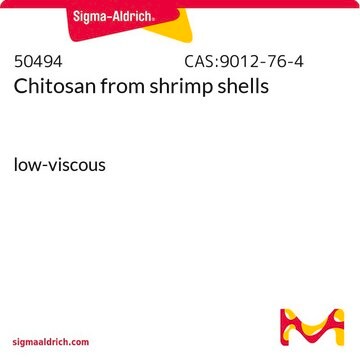C0794
Chitosanase from Streptomyces sp.
buffered aqueous glycerol solution, ≥15 units/mg protein (E1%)
Synonym(s):
Chitosan N-acetylglucosaminohydrolase
Sign Into View Organizational & Contract Pricing
All Photos(1)
About This Item
CAS Number:
MDL number:
UNSPSC Code:
12352204
NACRES:
NA.54
Recommended Products
form
buffered aqueous glycerol solution
specific activity
≥15 units/mg protein (E1%)
concentration
≥0.5 mg/mL
solubility
0.1 M acetate buffer, pH 5.5: soluble
storage temp.
−20°C
Application
Chitosanase from Sigma has been used for polarized light-stimulated, enzymatic hydrolysis of chitin and chitosan.
Biochem/physiol Actions
Chitosanase catalyzes the endohydrolysis of β-1,4-linkages between D-glucosamine (GlcN-GlcN) residues in chitosan. The enzyme from Streptomyces has been reported to also hydrolyze the GlcNAc-GlcN linkage in partially acetylated chitosan.
Unit Definition
One unit will liberate 1.0 μmole of reducing sugar (measured as D-glucosamine equivalents) from chitosan per minute at pH 5.5 at 37 °C.
Physical form
Solution in 50% glycerol containing 50 mM sodium acetate
Preparation Note
Soluble in 10mL of 0.1 M Acetate buffer at pH 5.5
Other Notes
View more information on enzymes for complex carbohydrate analysis at www.sigma-aldrich.com/enzymeexplorer
Storage Class
10 - Combustible liquids
wgk_germany
WGK 1
flash_point_f
Not applicable
flash_point_c
Not applicable
Certificates of Analysis (COA)
Search for Certificates of Analysis (COA) by entering the products Lot/Batch Number. Lot and Batch Numbers can be found on a product’s label following the words ‘Lot’ or ‘Batch’.
Already Own This Product?
Find documentation for the products that you have recently purchased in the Document Library.
Customers Also Viewed
Aretz, W., et al.
FEMS Microbiology Letters, 65, 31-31 (1989)
Tahira Naz et al.
Frontiers in nutrition, 8, 756218-756218 (2021-11-02)
Canthaxanthin is a reddish-orange xanthophyll with strong antioxidant activity and higher bioavailability than carotenes, primarily used in food, cosmetics, aquaculture, and pharmaceutical industries. The spiking market for natural canthaxanthin promoted researchers toward genetic engineering of heterologous hosts for canthaxanthin production.
Boucher, I., et al.
The Journal of Biological Chemistry, 270, 31-31 (1995)
T Fukamizo et al.
The Biochemical journal, 311 ( Pt 2), 377-383 (1995-10-15)
Chitosanase was produced by the strain of Streptomyces lividans TK24 bearing the csn gene from Streptomyces sp. N174, and purified by S-Sepharose and Bio-Gel A column chromatography. Partially (25-35%) N-acetylated chitosan was digested by the purified chitosanase, and structures of
Anna Konieczna-Molenda et al.
Carbohydrate research, 343(18), 3117-3119 (2008-10-01)
Illumination with white linearly polarized light (WLPL) stimulated chitinase and chitosanase in their degradation of chitin and chitosan, respectively. Enzymes were illuminated at room temperature in separate vessels, then admixed in reactors containing polysaccharides. Hydrolysis of chitosan to glucosamine followed
Our team of scientists has experience in all areas of research including Life Science, Material Science, Chemical Synthesis, Chromatography, Analytical and many others.
Contact Technical Service






